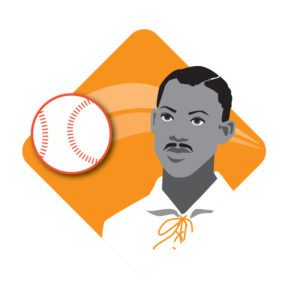In 1882, Moses Fleetwood Walker led the U-M baseball team to a 10–3 season. The next year, he abandoned his law studies in Ann Arbor to play pro ball. On May 1, 1884, he took the field with the Toledo Blue Stockings of the American Association as the first Black player in the major leagues.
 In his one season at Michigan, the Wolverines outscored their opponents 59–21, and local reporters gushed over the catcher. “The general verdict is that the man in the mask is a wonder,” exclaimed J.T. Winship in the Ann Arbor Chronicle.
In his one season at Michigan, the Wolverines outscored their opponents 59–21, and local reporters gushed over the catcher. “The general verdict is that the man in the mask is a wonder,” exclaimed J.T. Winship in the Ann Arbor Chronicle.
“He did some of the finest work behind the bat that had ever been seen in Ann Arbor,” wrote H.S. Mahon.
In a game against Wisconsin, the college paper reported, Walker came to bat with two on and two out and hit “the most beautiful home run seen on the grounds this year.” He crossed home plate “to tumultuous applause.”
Walker was born to mixed-race parents in 1856 in Mount Pleasant, Ohio, a Quaker community and an important stop on the Underground Railroad. He initially went to Oberlin College, enrolling in 1880. After Oberlin’s 1881 season ended with a 9–2 win over a visiting Michigan team, he transferred to U-M the next spring, arriving with his pregnant eighteen-year-old wife.
Fleet Walker almost didn’t get to play for Toledo, a member of the Northwestern League: in 1883, the minor league narrowly rejected a formal proposal to ban Black players. But Walker’s rifle arm and powerful bat led Toledo to a pennant, and when the club joined the major leagues in the American Association the following year, Walker was in the lineup, enduring hostility from fans, the press, and even his own teammates.
In those days, catcher was baseball’s most demanding and important position. Catchers didn’t wear gloves and had no chest protectors, only a rudimentary face mask. Their hands were often bruised and sometimes broken. When his racist teammate Tony Mullane ignored his catcher’s sign and threw him a pitch he hadn’t called for, Walker stopped giving him signals altogether.
Between injuries and all the abuse, Walker had just 152 at-bats in his historic 1884 season. He spent the rest of his career back in the minor leagues, where dozens of Black players were tolerated for a few more years.
He was widely hailed as one of the best catchers in the game, but thoroughly reviled too. In New Castle, Pennsylvania, where he played part of one season, the local press called him “brilliant behind the plate” and a “gentleman on and off field.” Before a scheduled game in Richmond, Virginia, however, his manager received a letter warning of “75 determined men who have sworn to mob Walker if he comes to the ground.” Wisely, Walker didn’t make the trip.
Walker was inducted into Oberlin’s Hall of Fame in 1990, but he is not among the three dozen baseball players and coaches in the U-M Athletic Hall of Honor. He remained the only Black major leaguer until Jackie Robinson’s debut with the Dodgers in 1947.